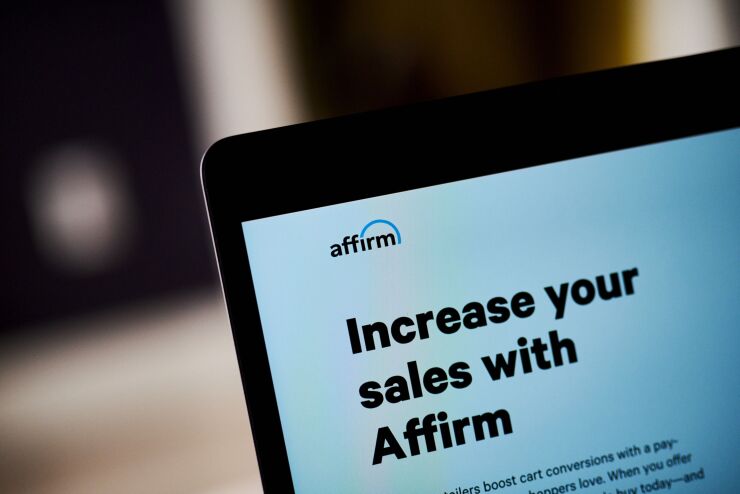With more banks and fintech companies offering buy now/pay later lending, Affirm is trying to differentiate itself by making it easier for merchants to integrate its product.
The San Francisco-based company is an early adopter of a Fiserv point-of-sale technology that places BNPL offers into the checkout flows of thousands of merchants.
"We want to be able to offer Affirm access with just a few clicks and not a lot of integration work," said Geoff Kott, chief revenue officer at Affirm.

Fiserv is supporting the direct integration of BNPL into products such as its Carat omnichannel commerce system for larger businesses and its Clover point of sale business management tool for small to mid-sized businesses.
"Consumers are really attracted to BNPL, they find it to be a valuable payment option, and we want to make it simple for merchants to add these options," said Mark Hennin, a senior vice president and head of value-added services at Fiserv.
Fiserv's deal with Affirm is not exclusive, and Fiserv will sell its BNPL bundle to other fintechs and financial institutions in its client network in an effort to make it easier for merchants to offer a variety of BNPL options alongside general payment processing.
"If [merchants] can do a one-time integration, they can have access to Carat, Clover and BNPL providers," Hennin said.
Affirm is battling a growing range of competitors in the BNPL market.
Visa recently
Meanwhile, the BNPL provider
"There can only be a few BNPL options at the point of sale, so you want to be able to quickly acquire merchants at scale," said Ariana-Michele Moore, an advisor in Aite-Norvarica's retail banking and payments practice.
Affirm's strategy is to connect through direct merchant integrations, and through strategic partnerships that accelerate its ability to reach consumers. It's also hoping to enter new markets and cement its position as the so-called top-of-wallet BNPL choice for younger consumers.
As more consumers flock to BNPL, younger people are particularly interested in the product. About 75% of BNPL users are millennials and members of Generation Z, and these groups are expected to remain the primary BNPL borrowers for the next three years, according to
"These younger consumers won't complete a purchase unless there's a BNPL option at checkout," Affirm's Kott said.
By working with Fiserv at this early stage, Affirm hopes to get a jump on reaching consumers and merchants in the health care and travel markets, where BNPL is starting to take hold as a payment and financing option. Affirm and Klarna have both recently entered partnerships
"We want to be able to offer Affirm access with just a few clicks and not a lot of integration work, particularly with inflation taking off and people looking for financing alternatives," Kott said.
He noted that Fiserv's technology enables 12,000 financial transactions per second. Such scale should help fuel Affirm's growth, he said.
"We want to be able to get BNPL to merchants through their own operating system," Kott said.
Affirm struck a similar partnership with the Dutch payment processor Adyen in 2020. It placed Affirm as a BNPL option at the point of sale for Adyen's merchants.
Affirm has an existing roster of more than 207,000 merchants, including Walmart, Williams Sonoma, Target, Shopify and Peloton. It has 12.7 million active consumers.
Notably, Affirm is also
Big-name clients such as Amazon are important, but they are not the whole market. "[Fiserv's] Clover targets small to medium-sized businesses, so that helps Affirm target that segment," Moore said.
FIS, a direct competitor of Fiserv, did not answer a request for comment on its involvement with Visa Ready and its general BNPL strategy. Both Fiserv and FIS have added merchant technology to their existing slate of products through acquisitions. Fiserv bolstered its merchant acquiring capabilities when it
Among payment technology firms, PayPal has the largest share of the U.S. BNPL market at just under 50%, according to research from
BNPL lending is traditionally positioned as an alternative to credit card debt. While traditional card issuers have not played a major role in the BNPL market so far, that is changing, as
"They're all competing for the top of the market, and there's so many firms out there," Moore said.
Kate Fitzgerald contributed to this story.





